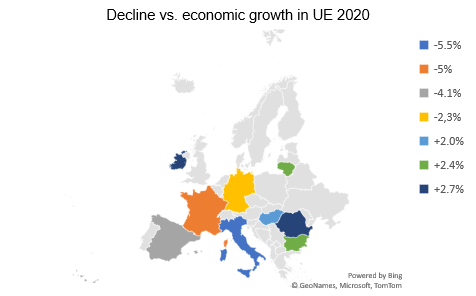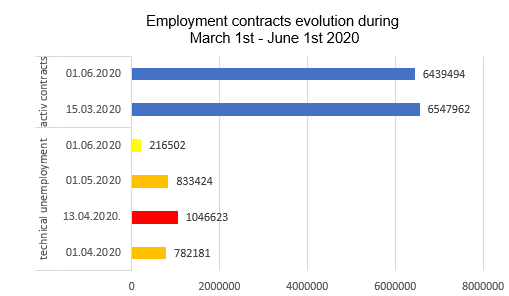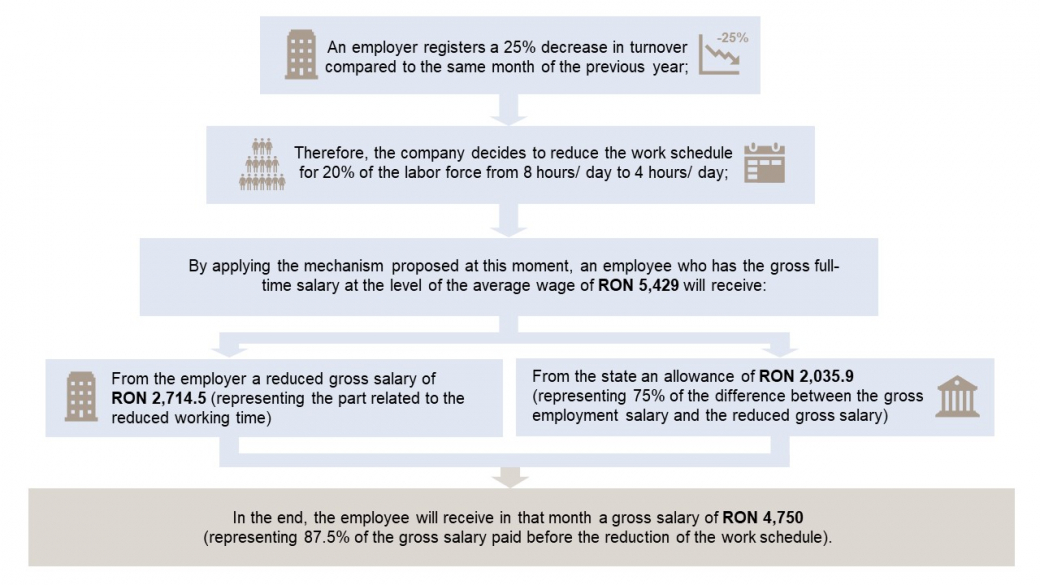
The National Plan for Investments and Economic Recovery
To face the current challenges, we need to build a regenerative and collaborative economy. On Wednesday, July 1st, 2020, the Romanian Government announced the National Plan for Investments and Economic Recovery, which was expected by the entire business environment for several weeks.
A notable aspect highlighted by the Government in the current context is that Romania has registered the second (after Ireland) highest economic growth in the EU, although the first signs of economic decrease at the level of the State Members appeared earlier, in the first semester of this year, with an average of -2.6% for EU27 and -3.2% for the Euro Zone.
Source: National Plan for Investments and Economic Recovery, Romanian Government, July 2020
Although the number of suspended or concluded employment contracts decreased on June 1st, compared to previous months, the companies affected by COVID-19, as a result of the temporary closing of their activity, are closely following the support measures from the Romanian Government applicable in the coming months of 2020.
Source: National Plan for Investments and Economic Recovery, Romanian Government, July 2020
“As we expected at the beginning of March, the impact on the employment contracts is strongly felt, both in terms of the economic agents’ capacity to manage the human resources and at the level of the commercial relationships with the business partners. Although companies in sectors such as food and consumer goods retail, pharmaceutical, provision of health related services and other specialized essential services have enormously helped in this period, the number of terminated contracts and the technical unemployment rate is very high. We hope that this plan for Romania’s economic recovery will have good results and that the financially stable industries will continue with these solidarity initiatives.”, mentioned Andreea Georgescu, Head of HR Advisory, Mazars Romania.
At the moment, the Government confirms that they will further support, by the measures taken the following:
- Prevention of layoffs after the crisis period, including also the period following technical unemployment;
- Protecting workplaces in the strategic sectors;
- Reintegration on the labor market of the persons who change their filed of activity, including Romanians who returned from working in other countries;
- Maintaining the production lines on the internal market.
This support will be based on three instruments:
I.Non-reimbursable European Funds (POCU);
II.SURE Programme of the European Commission;
III. State budget/ Unemployment insurance budget.
The most expected measures in the following period are those which shall clarify how the employers may use the funding scheme of the short-time work (flexible work). This funding scheme will be covered by the funds made available to the EU State Members through the SURE Programme. The objective of the initiative is to support the resumption of the activity by the employees who will have a short-time working schedule, by funding part of the salaries.
“The financial support proposed by the Government (inspired, to a certain extent, by the Kurzarbeit model implemented in Germany for several decades) would be applicable at the level of companies whose turnover decreases by at least 10% compared to the similar month of the previous year and which would reduce, consequently, the working hours for at least 10% of their employees. In such a case, the employer will cover part of the gross salary as per the employment contract, on a pro-rata basis with the reduced working schedule. Through a system administered by ANOFM, the State will pay on top a compensation of maximum 75% of the difference between the gross salary earned by the individual before the reduction of his/her working schedule (i.e. the gross salary without reduction) and the reduced gross salary paid by the employer for the shortened work schedule. However, the additional rights of the employee will not be affected, in accordance with their individual/collective employment agreements or internal regulations (for instance, existing benefits).”, mentioned Lucian Dumitru, Senior Manager, Tax Advisory, Mazars Romania.
The measure can be implemented for a minimum period of three to six months.
We present below a calculation scenario:
Mazars Romania is conducting a survey regarding the interest of the business environment in Romania, in accessing this mechanism. The detailed results will be published shortly. Together, we can enhance the Romanian economy, through collaboration and mutual support, both from the business environment and from the Romanian Government.
Media Contact
Emilia Popa, Head of Marketing and Communication, Mazars Romania
Emilia.Popa@mazars.ro | +40741.111.042
About Mazars
Mazars is an internationally integrated partnership, specializing in audit, accountancy, advisory, tax and legal services. Operating in 91 countries and territories around the world, we draw on the expertise of 40,400 professionals – 24,400 in the Mazars integrated partnership and 16,000 via the Mazars North America Alliance – to assist clients of all sizes at every stage in their development.
In Romania, Mazars has 25 years of experience in audit, tax advisory, financial advisory services, HR Advisory and accounting & payroll services. The local team has 230 professionals.
www.mazars.ro | https://www.linkedin.com/MazarsRomania/
[1] Where permitted under applicable country laws




